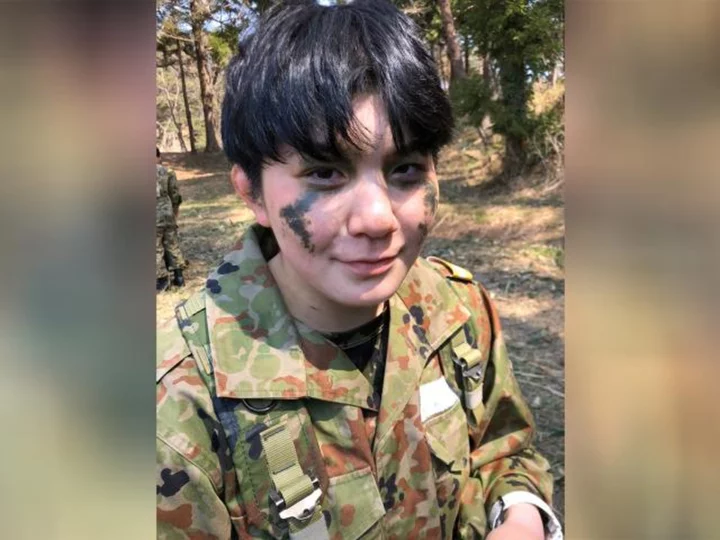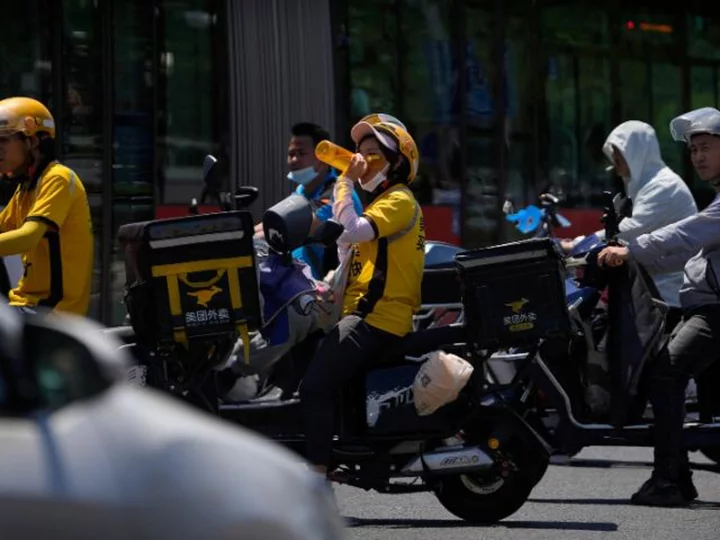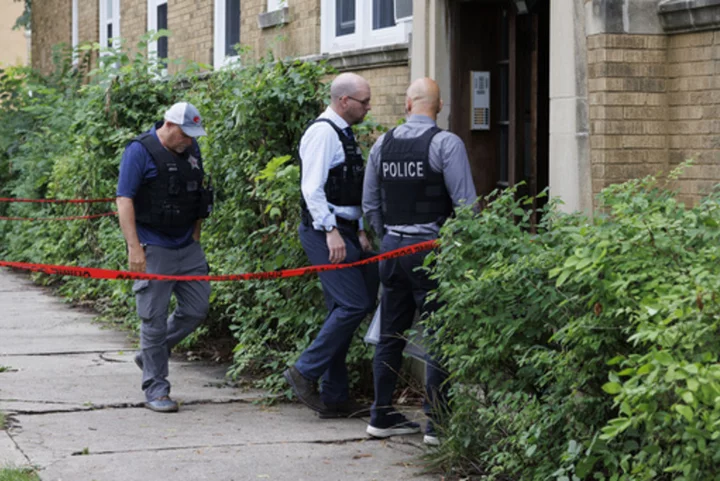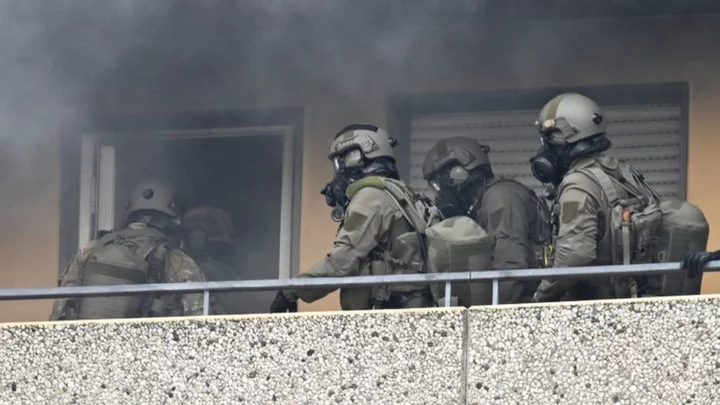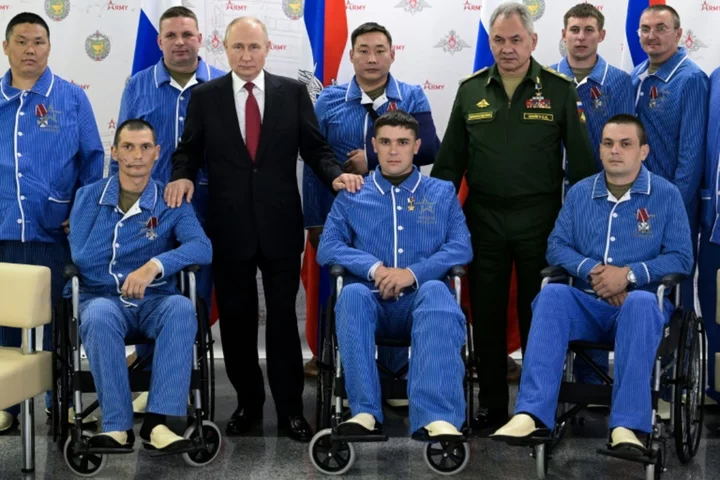Rina Gonoi is a fighter.
As a former soldier, as a judo practitioner, and as a woman battling on behalf of all women to bring those who sexually abused her to account.
When Gonoi served in Japan's Self-Defense Force (JSDF), she says she endured physical and verbal sexual abuse on a daily basis for more than a year, and vowed when she left the force in June 2022 after two years' service that she would bring her tormentors to justice.
At first, authorities seemed unwilling to believe her. When she reported the alleged abuse to military authorities, two investigations were launched, but both were dropped on grounds of lack of evidence.
Undefeated, she approached TV stations. When they ignored her, she took her battle to social media -- a rare move in a country where sexual assault survivors can face backlash for raising their voices.
"I wanted to help other people who had also been sexually harassed (in the JSDF). As for the perpetrators, I wanted an apology and for them to admit to what they had done; I wanted to prevent others from going through what I went through; that's why I spoke out," she said.
Gonoi's refusal to be silenced eventually prompted a wide-sweeping probe into sexual harassment across the JSDF and prosecutors reopened an investigation that found she had endured physical and verbal sexual harassment daily between autumn 2020 and August 2021, according to Gonoi's defense team.
The findings resulted in a groundbreaking moment: a rare admission of guilt and a public apology from Japan's Ministry of Defense, as Ground Self-Defense Force Chief of Staff Yoshihide Yoshida bowed deeply, saying: "On behalf of the Ground Self-Defense Forces, I would like to express my deepest apologies to Ms. Gonoi, who has been suffering for a long time. I am very sorry."
Five servicemen were also dishonorably dismissed and four others punished last December, according to NHK, Japan's public broadcaster. Gonoi also said she received in-person apologies from several officers.
But this, she said, is not enough, and she is now pursuing both criminal and civil cases in the courts. At the start of the year she filed lawsuits against the government and her alleged assailants -- three of whom were indicted in March on charges of sexually assaulting Gonoi. In the criminal case, to date, neither the defendants nor their lawyers have issued statements. Public prosecutors in Japan have not released information regarding the case and did not respond to CNN's request for comment. In the civil case, four of the five accused recently denied sexual abuse, while a fifth admitted the accusation.
The state has responded saying harassment "cannot be tolerated" but has not yet commented on Gonoi's lawsuit.
Regardless of the outcome of those lawsuits, Gonoi believes there is a bigger battle to be fought against what she sees as a culture of sexual harassment in the male-dominated military.
Speaking out
Japan's struggles with gender inequality, which were highlighted during the #MeToo campaign, are well-documented. The country ranks bottom of all the G7 nations and 116th out of 146 countries in the World Economic Forum's index for gender inequality.
But Gonoi's experience is likely to be particularly damaging for the JSDF, which has poured much effort into promoting an image of itself as an institution that promotes gender equality.
Fumika Sato, a sociologist at Hitotsubashi University, said many women opt to join the military as they see it as offering greater job security and gender equality than the private sector.
"(Women) choose the JSDF because they think it is an organization that will recognize their abilities fairly. It's very rare to hear that they joined to protect the country out of a sense of national defense," Sato said.
Gonoi, for instance, joined the ground forces in April 2020, seeing it both as a way of "paying it forward" but also a way of achieving her dreams of training as a judoka and competing at the Olympics.
Despite the JSDF's image, Sato said sexual harassment within the ranks has long been an issue but it is often hidden because people in the military often find it hard to admit vulnerability.
"There's an image that only strong personnel are considered suitable for the organization, and there's the attitude that those who say they are victims of harassment have no place in the organization," Sato explained. "That makes it hard for people to speak out."
Recruitment shortfall
Gonoi's fight also comes just as the JSDF faces a recruitment shortfall that is undermining its efforts to grow its military amid rising regional tensions with North Korea and China.
Last year, Japan announced it would boost its defense budget for 2023 to a record 6.8 trillion yen ($55 billion), a 26% increase, raising its defense spending to 2% of GDP by 2027.
Experts say attracting enough women will be key to Tokyo meeting its objectives. The JSDF is meant to have a strength of around 250,000 service members but has consistently failed to reach its recruitment goals and says it is understaffed by around 16,000 service members -- a shortfall that experts say has limited its operational abilities.
The force has spent years trying to encourage female enrollment, in line with the "womenomics" policy of former Prime Minister Shinzo Abe aimed at combating the effects of Japan's aging population and shrinking workforce. In April 2015, the Defense Ministry launched a series of initiatives in which funds were allocated for everything from gender awareness programs to establishing of day care centers for children of JSDF employees.
But Japan still lags its peers. According to the Defense Ministry, as of March 2022, there were 20,000 women in the JSDF, comprising around 8% of the organization's total strength, which still lags the NATO average of 12% as of 2019. And to reach that threshold by 2030, Tokyo needs to reach more women.
A spokesperson for Japan's Ground Self-Defense Force told CNN, "We believe that the promotion of female SDF personnel is important for securing high-quality personnel in a stable manner and for incorporating diversity into the organization. The SDF continues to actively recruit female SDF personnel with the aim of increasing the proportion of women in all SDF personnel to 12% or more by (fiscal year) 2030."
Setback for progress
The JSDF has made progress in this regard. When it was first formed in 1954, women were recruited exclusively as nurses.
Japan's navy accepted its first female recruits in 1977. And in the early 1990s, most roles -- except those requiring combat -- opened up to women.
In 1992, Japan's National Defense Academy finally began accepting women, which made it possible for them to become senior officers. Since then, new women leaders have started taking the reins. For example, in March 2018, Japan's navy appointed the first woman commander of a warship squadron. Later that year, it appointed its first woman fighter pilot.
As a child, Gonoi says she saw JSDF members as heroes. She grew up wanting to be like them after women officers -- in particular -- came to her rescue following the deadly 2011 Tohoku earthquake and tsunami disaster that decimated her hometown of Higashi-Matsushima in Japan's northern prefecture of Miyagi.
Gonoi had marveled at how the JSDF members helped citizens regain a sense of normalcy, she said, making sure they had makeshift areas to bathe, for instance. The young Gonoi was sold by that human touch.
A dream dashed
Years later, it would be a posting to a JSDF station in Fukushima -- another area that was decimated by the 2011 disaster -- where she tells CNN she first experienced sexual harassment.
"They'd comment on my body and the size of my breasts. Or they'd come up to me in the hallways and suddenly hug me in the corridor. That kind of thing happened daily," Gonoi recalled of her time in the station.
The last straw came in August 2021, when Gonoi said she was pinned to a dormitory floor as several senior male officers simulated sexual intercourse. It was this incident that convinced her to come forward and report her assailants.
But Gonoi's claims were dismissed, and no action was taken internally within the JSDF.
"They initially didn't admit that they'd done anything wrong. They tried to cover up what I'd gone through, but then a re-investigation was ordered. That's when they admitted what I'd gone through," said Gonoi.
An external investigation was also dropped due to "lack of evidence" as none of the male personnel who witnessed her sexual assault would provide testimony.
Eventually, Gonoi says she felt like she had no other choice but to quit in June 2022.
Sato, the sociologist, said that it was only by taking her fight to social media to publicize her case that Gonoi had been able to pressure the JSDF into a rethink.
"The Defense Ministry acted as it had always done in the past, taking the side of the perpetrators and isolating the victims. However, this resulted in so much public outrage, surprising so many people in the Defense Ministry, that they realized that if they didn't take proper action, the reputation of the (military) itself would be at stake," Sato said.
In recent months, the Defense Ministry has sought to improve its image. In March, Japan's Defense Minister Yasukazu Hamada asserted that "harassment shakes the foundations of the JSDF by destroying mutual trust among its members and is something that should never be allowed to happen."
A spokesperson for the Ground Self-Defense Force told CNN, "Harassment is a violation of basic human rights and, of course, must never be allowed to happen in the Ground SDF, where unit actions are the basis, as it causes loss of mutual trust and shakes the strength of the personnel.
"For this reason, the GSDF is actively participating in various efforts to eradicate harassment based on the minister's directive and is carefully implementing measures such as education for its commanders and others.
"To this end, we will continue to implement measures such as group education and e-learning to raise the awareness of personnel, education to promote understanding and improve the leadership skills of personnel (especially managers) and improve and strengthen the consultation system."
A battle won, now the war
Gonoi tells CNN she went back and forth on her decision, before finally raising her voice.
"When you speak out there is a big risk that you'll be beaten down and people will slander you, even though what you went through is real and you're really suffering," Gonoi said.
But she didn't back down.
"(The JSDF) initially didn't admit that they'd done anything wrong -- they tried to cover up what I'd gone through, but then a re-investigation was ordered; that's when they admitted what I'd gone through."
The government has yet to respond to Gonoi's lawsuits, but last October Japanese Prime Minister Fumio Kishida said he understood that sexual harassment cases were handled inappropriately by the Self-Defense Force and the Ministry of Defense during a parliamentary meeting.
He added that though harassment should "not be tolerated in any organization," there have been instances where cover-ups have been pointed out.
He asserted that the government and Defense Ministry are committed to eradicating all forms of harassment.
"We are aware that the perpetrators of sexual harassment cases are scheduled to be punished severely. We are also conducting a special defense inspection to thoroughly identify harassment. We are committed to eradicating all forms of harassment," he said.
In a news conference last year, Gonoi said three of her perpetrators got down on their hands and knees to apologize after she received direct apologies from four of her assailants. She said the perpetrators acknowledged their actions and repeatedly bowed their heads, and one was crying.
"When I joined the JSDF, I had a lot of dreams of what I wanted to achieve there. Had the JSDF fully investigated what happened to me I feel like I could've still stayed on there. Everything came too late," she said.
The officers were dismissed last December, but Gonoi questions the sincerity of their apologies and decided to pursue both a civil and criminal case -- not for money, she says, but because she wanted "an apology from the heart."
In the civil case, four of the five plaintiffs recently denied sexual abuse, while a fifth admitted the accusations. Gonoi told reporters after the hearing, "I felt a variety of feelings -- sadness, frustration, anger, etc -- that I can't express in words. I knew that their apology was only a formality."
Meanwhile, the government has said it will continue to "establish drastic measures" that strive to "build an organizational environment that does not tolerate harassment at all."
Today, Gonoi said she receives abuse on social media with some users commenting on her appearance or accusing her of tarnishing the JSDF's reputation.
She has battled depression and still has flashbacks of what happened to her, but is grateful for the support she received on social media.
She wants the JSDF to educate its forces to recognize harassment as a crime, to install surveillance cameras and to not allow women officers to be left alone in situations where they are highly outnumbered by male colleagues.
But she said she hasn't lost faith in the JSDF. Mostly, she wants it to be a safer place, so other new recruits will not have to endure what she did. She wants to travel and keep practicing judo.
"In Japan, there's a kind of view that you can't laugh, can't enjoy yourself after you've been a victim, but I don't want my life to be defined by that," Gonoi said.
"I'm glad I joined the SDF and I was able to work for my country. It wasn't all bad and I want to live life as normally as possible, knowing that everything ultimately works out somehow in the end."

